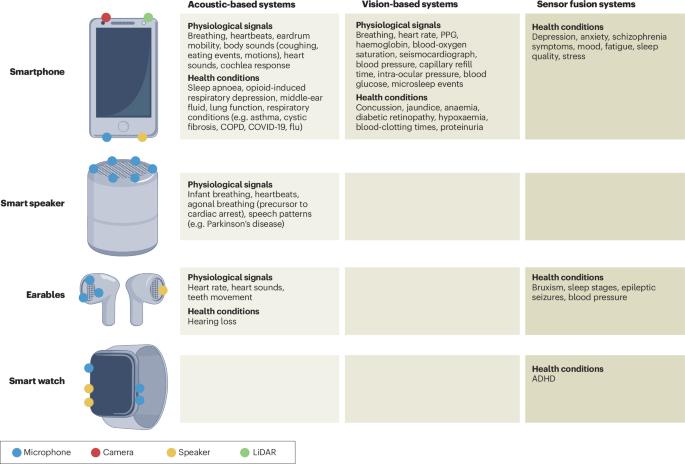Mobile medical systems for equitable healthcare
IF 37.6
引用次数: 0
Abstract
Major barriers to accessible healthcare include the high cost of medical devices and limited healthcare facilities. Mobile computing technologies, such as smartphones and smart watches, include high-quality hardware, such as microphones, speakers and cameras, which can be leveraged for the design of low-cost mobile medical systems intended to be remotely applied to monitor health and disease. In this Review, we discuss low-cost and accessible hardware — in particular, mobile phones — that can be used in mobile medical systems to aid in medical diagnostics and monitoring. Specifically, we outline acoustic-based systems, vision-based systems and sensor fusion systems that allow different levels of health and disease assessment, relying on the speakers, microphones and sensors of smart mobile devices. We highlight the challenges related to the deployment of mobile medical systems in the clinical continuum, including scaling, generalizability, bias, trust and privacy. Finally, we examine clinical integration and regulatory considerations with regard to mobile medical devices as well as future applications. The features of smart devices such as smartphones and smart watches, including speakers, microphones and other sensors, can be leveraged for the design of mobile medical systems. This Review discusses acoustic-based, vision-based and sensor fusion systems that rely on smart device hardware and software for remote health and disease assessment.

移动医疗系统促进公平医疗
获得医疗保健的主要障碍包括医疗设备成本高和医疗设施有限。智能手机和智能手表等移动计算技术包括麦克风、扬声器和摄像头等高质量硬件,可用于设计旨在远程监测健康和疾病的低成本移动医疗系统。在这篇综述中,我们讨论了低成本和可获得的硬件-特别是移动电话-可用于移动医疗系统,以帮助医疗诊断和监测。具体来说,我们概述了基于声学的系统,基于视觉的系统和传感器融合系统,这些系统可以依靠智能移动设备的扬声器,麦克风和传感器来进行不同水平的健康和疾病评估。我们强调了在临床连续体中部署移动医疗系统所面临的挑战,包括规模、普遍性、偏见、信任和隐私。最后,我们研究了关于移动医疗设备以及未来应用的临床整合和监管考虑。智能设备(如智能手机和智能手表)的功能,包括扬声器、麦克风和其他传感器,可用于移动医疗系统的设计。本综述讨论了基于声学、基于视觉和传感器的融合系统,这些系统依赖智能设备硬件和软件进行远程健康和疾病评估。
本文章由计算机程序翻译,如有差异,请以英文原文为准。
求助全文
约1分钟内获得全文
求助全文

 求助内容:
求助内容: 应助结果提醒方式:
应助结果提醒方式:


